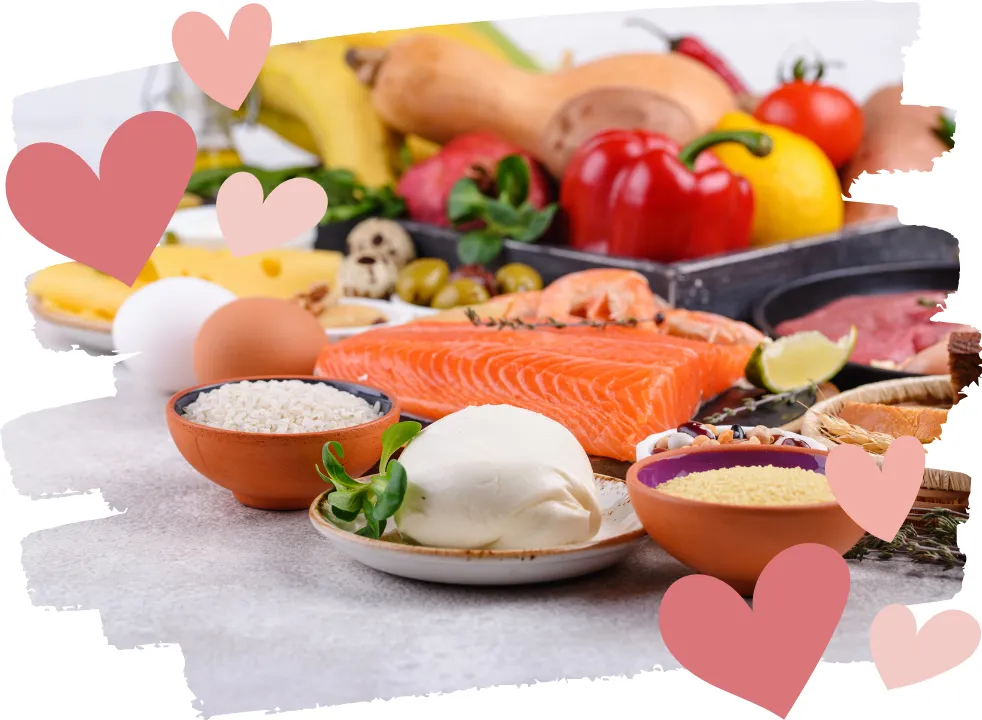
Fork It, I’m Moody: How Food Can Help You Feel Less Unhinged in Perimenopause
✨ Perimenopause Power Moves: 5 Simple Nutrition Shifts to Help You Feel Like Yourself Again!✨
Grab your free guide today!
👉 Download Now!
Fork It, I’m Moody: How Food Can Help You Feel Less Unhinged in Perimenopause
“With a woman’s life expectancy at eighty-four years, it is reasonable to expect that she will not only live thirty to forty years beyond menopause, but be vibrant, sharp, and influential as well. The menopause you will experience is not your mother’s (or grandmother’s) menopause.”
― Christiane Northrup, The Wisdom of Menopause: Creating Physical and Emotional Health During the Change
Perimenopause: Not Just Hot Flashes and Hormone Rage
Let’s be real—perimenopause is like puberty’s moodier, more unpredictable cousin. One moment you’re singing along to your favorite 90s jam, the next you’re crying because someone looked at you funny in the grocery store.
Sure, we’ve all heard about the hot flashes and wonky periods, but no one warned us about the mental minefield: mood swings that hit like a freight train, anxiety that won’t quit, and brain fog thick enough to misplace your own name.
But here’s the good news: you’re not broken. You’re not alone. And—plot twist—your fork might be your new best friend.
Hormonal Mood Mayhem: Why You Feel Like a Stranger in Your Own Head
Let’s break it down:
😢 Mood Swings That Make No Sense
Estrogen and progesterone are more than just “reproductive” hormones—they’re the behind-the-scenes crew managing your serotonin and dopamine. So when they start fluctuating like your Wi-Fi signal in a storm, your mood does too.
😬 Perimenopausal Anxiety: Hello, Overthinking Everything
Low progesterone means less natural chill, while estrogen spikes increase cortisol, aka the “everything is an emergency” hormone. No wonder you feel stuck in overdrive.
😵💫 The Sleep-Anxiety-Fog Trifecta
Sleep is sabotaged by night sweats, restless thoughts, and those classic 3 AM “what is the meaning of life” wakeups. And without rest? Your emotions don’t stand a chance.
How Food Becomes Your Midlife Mood Medicine
Now for the juicy part: food. Not in a “clean eating perfection” way—but in a “what can I eat to stop wanting to scream into the void” way.
🧐 Omega-3s: Your Brain’s BFF
These fatty acids are like lube for your brain—keeping things moving smoothly. Studies show they help with depression and anxiety.
Top picks: Salmon, sardines, flaxseeds, walnuts
(Bonus: they also support hormone production. Win-win.)
💖 Magnesium: Your Built-In Chill Button
Magnesium is the unsung hero for calming your nervous system, improving sleep, and easing tension. Basically, it’s a weighted blanket in mineral form.
Top picks: Dark leafy greens, almonds, avocados, dark chocolate (yes, please)
⚡ B Vitamins: The Burnout Blockers
B6 and B12 help your brain regulate mood, stress, and energy. When you’re low, everything feels heavier.
Top picks: Eggs, lean meats, seafood, lentils
(If you’re plant-based, consider a supplement—it’s hard to get enough B12 from food alone.)
🌞 Vitamin D: Sunshine in Supplement Form
Low D = low mood. Studies link low levels with increased depression in midlife women.
Top picks: Sunlight (when you can), mushrooms, and fatty fish, and take a vitamin D supplement of at least 1000 IU, especially if you live in northern climates.
✨ Iron: Because You’re Tired AF
Even with 8 hours of sleep, low iron can leave you dragging. And if you’re bleeding heavily? You're at risk.
Top picks: Grass-fed beef, spinach, lentils
(Pair with vitamin C for better absorption—hello, lemon vinaigrette!)
💧 Hydration: The Forgotten Fix
Dehydration ramps up anxiety and makes brain fog worse. No thanks.
Top picks: Water, herbal teas, electrolyte-rich drinks (like coconut water or Vega Hydrate)
Build a Mood-Boosting Plate Like a Pro
Start here:
Leafy Greens Base – Kale, arugula, spinach. Fiber + hormone support.
Protein + Healthy Fats – Salmon, chickpeas, avocado. Balanced blood sugar = balanced mood.
Colorful Veggies – Bell peppers, mushrooms, roasted beets. Antioxidants FTW.
Superfood Toppers – Flaxseeds, hemp hearts, bee pollen. Extra support for hormones and brain health.
Dressing That Does More – Olive oil + mashed berries + ACV = anti-inflammatory magic.
Your Mood-Saving Cheat Sheet
Feeling all over the place? Pin this somewhere handy:
For Mood Stability: Omega-3s (salmon, walnuts) + magnesium (avocados, almonds)
For Anxiety Relief: B vitamins (eggs, seafood) + vitamin D (sunshine, mushrooms)
For Energy & Clarity: Iron (spinach, beef) + hydration
For Better Sleep: Magnesium (greens, dark chocolate) + protein-rich snacks
Final Thoughts: You’re Not at the Mercy of Your Hormones
Listen, you don’t have to white-knuckle your way through midlife. You deserve to feel steady, sharp, and emotionally you. And while no food is a miracle cure, the right ones can help stabilize your mood, calm your nervous system, and give your beautiful brain the support it craves.
So next time you’re spiraling, skip the doom-scroll and go make yourself a hormone-happy plate.
💌 Want More Food + Mood Support?
Grab my free guide: Eat Your Way to Hormonal Harmony
It’s packed with tips, recipes, and easy food swaps to balance your hormones, support your emotional health, and feel like you again—no restriction, no stress.
Your journey. Your body. Your call. But support like this? Game-changer. 🥑💃
👉 Bonus Resource: Grab my Protein Power Plates recipe guide for simple, delicious meals designed to support your hormones and boost your mood—no chef skills required.
You’ve got this. One forkful at a time. 💪🍽️
Hormonally Yours,
Kimberlee Erin
Just a heads-up: I’m a Certified Menopause Coaching Specialist and Holistic Nutritionist, and while I love sharing what’s worked for me and my clients, this blog is for informational purposes only. It’s not a substitute for medical advice. Always check in with your healthcare provider before starting new supplements, hormones, or treatments—especially since every woman’s perimenopause journey is different. You deserve personalized care that truly fits you.